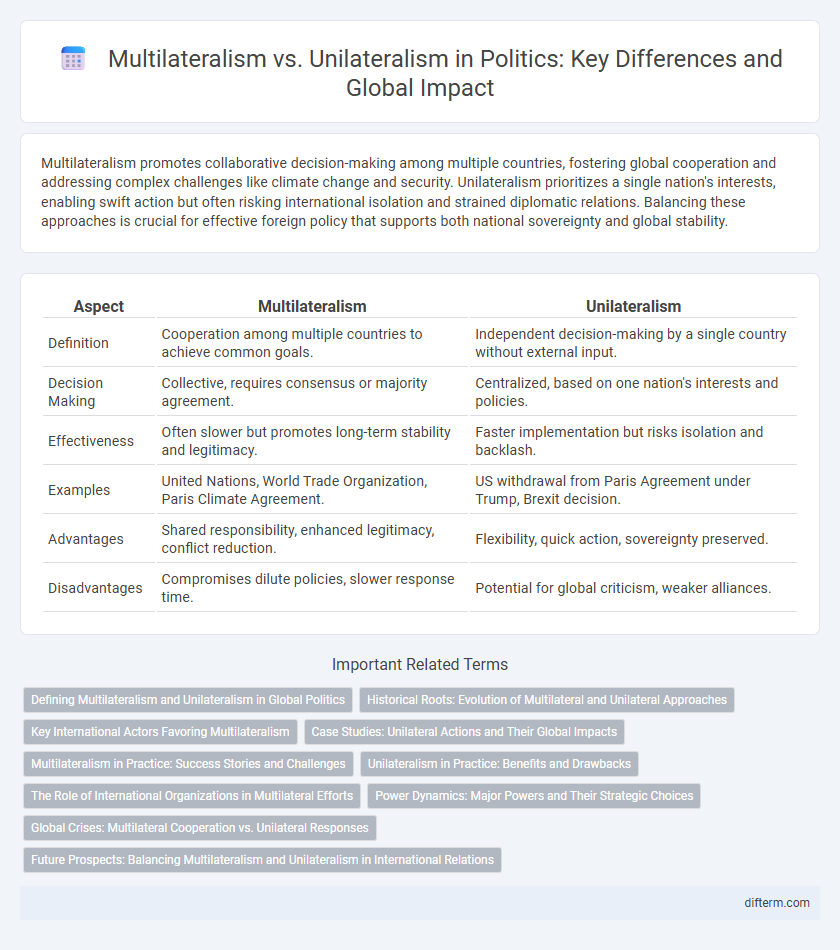Multilateralism promotes collaborative decision-making among multiple countries, fostering global cooperation and addressing complex challenges like climate change and security. Unilateralism prioritizes a single nation's interests, enabling swift action but often risking international isolation and strained diplomatic relations. Balancing these approaches is crucial for effective foreign policy that supports both national sovereignty and global stability.
Table of Comparison
| Aspect | Multilateralism | Unilateralism |
|---|---|---|
| Definition | Cooperation among multiple countries to achieve common goals. | Independent decision-making by a single country without external input. |
| Decision Making | Collective, requires consensus or majority agreement. | Centralized, based on one nation's interests and policies. |
| Effectiveness | Often slower but promotes long-term stability and legitimacy. | Faster implementation but risks isolation and backlash. |
| Examples | United Nations, World Trade Organization, Paris Climate Agreement. | US withdrawal from Paris Agreement under Trump, Brexit decision. |
| Advantages | Shared responsibility, enhanced legitimacy, conflict reduction. | Flexibility, quick action, sovereignty preserved. |
| Disadvantages | Compromises dilute policies, slower response time. | Potential for global criticism, weaker alliances. |
Defining Multilateralism and Unilateralism in Global Politics
Multilateralism in global politics involves multiple countries working together through institutions and agreements to address international issues and promote collective security, economic cooperation, and environmental sustainability. Unilateralism refers to a single nation's independent decision-making and actions without seeking consensus or support from other states, often emphasizing national sovereignty and self-interest. These contrasting approaches shape international relations by balancing cooperation and autonomy in addressing global challenges.
Historical Roots: Evolution of Multilateral and Unilateral Approaches
Multilateralism traces its historical roots to post-World War II institutions like the United Nations and Bretton Woods systems, emphasizing collective security and economic cooperation among sovereign states. Unilateralism, prominent in early 20th-century foreign policies, reflects nations prioritizing independent decision-making to safeguard national interests without external constraints. The evolution of these approaches highlights shifting power dynamics and the impact of global conflicts on international governance frameworks.
Key International Actors Favoring Multilateralism
Key international actors favoring multilateralism include the United Nations, the European Union, and the World Trade Organization, which advocate for collaborative decision-making to address global challenges. Countries like Germany, Canada, and Japan consistently support multilateral frameworks to promote international peace, security, and economic stability. These actors emphasize the importance of diplomacy, collective action, and adherence to international law in managing global issues.
Case Studies: Unilateral Actions and Their Global Impacts
Unilateral actions, as demonstrated by the U.S. withdrawal from the Paris Agreement in 2017, triggered widespread diplomatic tensions and hindered global climate cooperation. China's Belt and Road Initiative, while primarily state-driven, showcases unilateral decision-making that reshapes trade routes and influences geopolitical alliances across Asia and Africa. The 2003 Iraq invasion exemplifies how unilateral military interventions can destabilize regions, provoke international criticism, and challenge the legitimacy of global institutions like the United Nations.
Multilateralism in Practice: Success Stories and Challenges
Multilateralism in practice has led to significant achievements such as the Paris Agreement on climate change and the establishment of the World Trade Organization, which promote cooperative global solutions. Success stories highlight enhanced diplomatic dialogue, conflict resolution, and resource sharing among participating nations. Challenges include balancing national interests, ensuring compliance, and managing power asymmetries in international institutions.
Unilateralism in Practice: Benefits and Drawbacks
Unilateralism in practice allows states to act swiftly and decisively without the delays inherent in multilateral negotiations, enabling rapid response to national interests and security threats. However, this approach risks diplomatic isolation, undermines international cooperation, and can provoke retaliatory measures from other countries. The trade-off between sovereignty preservation and global collaboration often shapes a state's strategic calculus in choosing unilateral actions over multilateral agreements.
The Role of International Organizations in Multilateral Efforts
International organizations such as the United Nations, World Trade Organization, and the International Monetary Fund play a crucial role in facilitating multilateral efforts by providing a structured platform for dialogue, conflict resolution, and cooperative policymaking among member states. These institutions enable coordinated responses to global challenges like climate change, security threats, and economic instability, which unilateral actions often fail to address effectively. Their ability to aggregate diverse interests and enforce international norms strengthens multilateralism and fosters global stability.
Power Dynamics: Major Powers and Their Strategic Choices
Major powers navigate complex power dynamics by balancing multilateralism and unilateralism to maximize their strategic influence. Multilateral institutions offer a platform for coalition-building and legitimacy, while unilateral actions can swiftly assert national interests without compromising on sovereignty. The choice hinges on geopolitical context, resource capabilities, and long-term strategic goals, shaping global governance and conflict resolution outcomes.
Global Crises: Multilateral Cooperation vs. Unilateral Responses
Multilateralism fosters coordinated global responses to crises such as pandemics, climate change, and economic instability, leveraging collective resources and expertise for enhanced effectiveness. Unilateralism often leads to fragmented solutions and diminished global trust, undermining opportunities for comprehensive and sustainable outcomes. Collaborative international frameworks like the United Nations and World Health Organization exemplify the critical role of multilateral cooperation in addressing complex global challenges.
Future Prospects: Balancing Multilateralism and Unilateralism in International Relations
Future prospects in international relations hinge on balancing multilateralism and unilateralism to address complex global challenges effectively. While multilateralism fosters cooperation through institutions like the United Nations and World Trade Organization, unilateralism allows states to act swiftly based on national interests. Achieving a strategic equilibrium enables nations to leverage collective decision-making without compromising sovereign agility in rapidly evolving geopolitical landscapes.
multilateralism vs unilateralism Infographic

 difterm.com
difterm.com